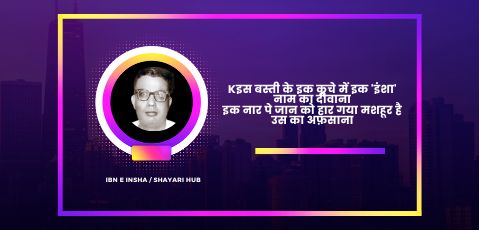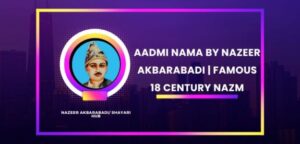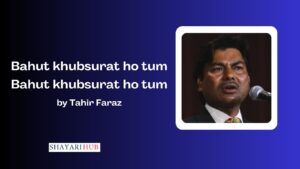इस बस्ती के इक कूचे में इक ‘इंशा’ नाम का दीवाना, इंशा के दीवाने, इंशा का प्रेम, इंशा की शायरी, इंशा के गीत, इंशा के शेर, इंशा के कलम के नगमे, इंशा के सुनहरे अल्फाज़ | is basti ke ek kuche mein ek ‘insha’ nam ka diwana by Ibn e Insha Nazm
A warm welcome to this blog post, where we pay homage to the literary genius, Ibn-e-Insha, and explore the profound impact of his timeless work, “इस बस्ती के इक कूचे में इक ‘इंशा’ नाम का दीवाना.” In this article, we delve into the captivating world of Urdu literature and celebrate the poetic brilliance of the maestro.
Join us on this poetic journey, as we pay tribute to the legacy of ‘इंशा‘ and its place in the hearts of countless admirers.
इस बस्ती के इक कूचे में इक ‘इंशा’ नाम का दीवाना
इस बस्ती के इक कूचे में इक ‘इंशा’ नाम का दीवाना
इक नार पे जान को हार गया मशहूर है उस का अफ़साना
उस नार में ऐसा रूप न था जिस रूप से दिन की धूप दबे
इस शहर में क्या क्या गोरी है महताब-रुख़े गुलनार-लबे
कुछ बात थी उसकी बातोंमें कुछ भेद थे उसकी चितवन में
वही भेद कि जोत जगाते हैं किसी चाहने वाले के मन में
उसे अपना बनाने की धुन में हुआ आप ही आप से बेगाना
इस बस्ती के इक कूचे में इक ‘इंशा’ नाम का दीवाना
…फ़ोन पे उन की बातें थीं
ना चंचल खेल जवानी के ना प्यार की अल्हड़ घातें थीं
बस राह में उन का मिलना था या फ़ोन पे उन की बातें थीं
इस इश्क़ पे हम भी हँसते थे बे-हासिल सा बे-हासिल था
इक ज़ोर बिफरते सागर में ना कश्ती थी ना साहिल था
जो बात थी इन के जी में थी जो भेद था यकसर अन-जाना
इस बस्ती के इक कूचे में इक ‘इंशा’ नाम का दीवाना
इक रोज़ मगर बरखा-रुत में वो भादों थी या सावन था
दीवार पे बीच समुंदर के ये देखने वालों ने देखा
मस्ताना हाथ में हाथ दिए ये एक कगर पर बैठे थे
यूँ शाम हुई फिर रात हुई जब सैलानी घर लौट गए
क्या रात थी वो …
क्या रात थी वो जी चाहता है उस रात पे लिक्खें अफ़साना
इस बस्ती के इक कूचे में इक ‘इंशा’ नाम का दीवाना
हाँ उम्र का साथ निभाने के थे अहद बहुत पैमान बहुत
वो जिन पे भरोसा करने में कुछ सूद नहीं नुक़सान बहुत
वो नार ये कह कर दूर हुई ‘मजबूरी साजन मजबूरी’
ये वहशत से रंजूर हुए और रंजूरी सी रंजूरी?
उस रोज़ हमें मालूम हुआ…
उस रोज़ हमें मालूम हुआ उस शख़्सका मुश्किल समझाना
इस बस्ती के इक कूचे में इक ‘इंशा’ नाम का दीवाना
गो आग से छाती जलती थी गो आँख से दरिया बहता था
हर एक से दुख नहीं कहता था चुप रहता था ग़म सहता था
नादान हैं वो जो छेड़ते हैं इस आलम में नादानों को
उस शख़्स से एक जवाब मिला सब अपनों को बेगानों को
कुछ और कहो तो सुनता हूँ इस बाब में कुछ मत फ़रमाना’
इस बस्ती के इक कूचे में इक ‘इंशा’ नाम का दीवाना
अब आगे का तहक़ीक़ नहीं…
अब आगे का तहक़ीक़ नहीं गो सुनने को हम सुनते थे
उस नार की जो जो बातें थीं उस नार के जो जो क़िस्से थे
इक शाम जो उस को बुलवाया कुछ समझाया बेचारे ने
उस रात क़िस्सा पाक किया कुछ खा ही लिया दुखयारे ने
क्या बात हुई किस तौर हुई अख़बार से लोगों ने जाना
इस बस्ती के इक कूचे में इक इंशा नाम का दीवाना
हर बातकी खोज तो ठीक नहीं तुम हमको कहानी कहने दो
उस नार का नाम मक़ाम है क्या इस बात पे पर्दा रहने दो
हमसे भी तो सौदा मुमकिन है तुमसे भी जफ़ा हो सकती है
ये अपना बयाँ हो सकता है ये अपनी कथा हो हो सकती है
वो नार भी आख़िर पछताई किस काम का ऐसा पछताना?
इस बस्ती के इक कूचे में इक ‘इंशा’ नाम का दीवाना
ALSO READ Kaun Pursan e Haal Hai Mera by Saqi Amrohvi
is basti ke ek kuche mein ek ‘insha’ nam ka diwana
is basti ke ek kuche mein ek ‘insha’ nam ka diwana
ek nar pe jaan ko haar gaya mashhur hai us ka afsana
us nar mein aisa rup na tha jis rup se din ki dhup dabe
is shahr mein kya kya gori hai mahtab-ruKHe gulnar-labe
kuchh baat thi us ki baaton mein kuchh bhed the us ki chitwan mein
wahi bhed ki jot jagate hain kisi chahne wale ke man mein
use apna banane ki dhun mein hua aap hi aap se begana
is basti ke ek kuche mein ek ‘insha’ nam ka diwana
phone pe un ki baaten thin
na chanchal khel jawani ke na pyar ki alhaD ghaten thin
bas rah mein un ka milna tha ya phone pe un ki baaten thin
is ishq pe hum bhi hanste the be-hasil sa be-hasil tha
ek zor bipharte sagar mein na kashti thi na sahil tha
jo baat thi in ke ji mein thi jo bhed tha yaksar an-jaana
is basti ke ek kuche mein ek ‘insha’ nam ka diwana
ek roz magar barkha-rut mein wo bhadon thi ya sawan tha
diwar pe bich samundar ke ye dekhne walon ne dekha
mastana hath mein hath diye ye ek kagar par baiThe the
yun sham hui phir raat hui jab sailani ghar lauT gae
kya raat thi wo…
kya raat thi wo ji chahta hai us raat pe likkhen afsana
is basti ke ek kuche mein ek ‘insha’ nam ka diwana
han umr ka sath nibhane ke the ahd bahut paiman bahut
wo jin pe bharosa karne mein kuchh sud nahin nuqsan bahut
wo nar ye kah kar dur hui ‘majburi sajan majburi’
ye wahshat se ranjur hue aur ranjuri si ranjuri?
us roz hamein malum hua…
us roz hamein malum hua us shaKHs ka mushkil samjhana
is basti ke ek kuche mein ek ‘insha’ nam ka diwana
go aag se chhati jalti thi go aankh se dariya bahta tha
har ek se dukh nahin kahta tha chup rahta tha gham sahta tha
nadan hain wo jo chheDte hain is aalam mein na-danon ko
us shaKHs se ek jawab mila sab apnon ko beganon ko
‘kuchh aur kaho to sunta hun is bab mein kuchh mat farmana’
is basti ke ek kuche mein ek ‘insha’ nam ka diwana
ab aage ka tahqiq nahin…
ab aage ka tahqiq nahin go sunne ko hum sunte the
us nar ki jo jo baaten thin us nar ke jo jo qisse the
ek sham jo us ko bulwaya kuchh samjhaya bechaare ne
us raat ye qissa pak kiya kuchh kha hi liya dukhyare ne
kya baat hui kis taur hui aKHbar se logon ne jaana
is basti ke ek kuche mein ek insha nam ka diwana
har baat ki khoj to Thik nahin tum hum ko kahani kahne do
us nar ka nam maqam hai kya is baat pe parda rahne do
hum se bhi to sauda mumkin hai tum se bhi jafa ho sakti hai
ye apna bayan ho sakta hai ye apni katha ho ho sakti hai
wo nar bhi aaKHir pachhtai kis kaam ka aisa pachhtana?
is basti ke ek kuche mein ek ‘insha’ nam ka diwana
FAQ- इस बस्ती के इक कूचे में इक ‘इंशा’ नाम का दीवाना
What is the significance of ‘इस बस्ती के इक कूचे में इक ‘इंशा’ नाम का दीवाना’?
‘इस बस्ती के इक कूचे में इक ‘इंशा’ नाम का दीवाना’ is an iconic poem by the legendary Urdu poet, Ibn-e-Insha. The poem beautifully narrates the tale of a devotee enamoured by the name ‘इंशा’ as he roams the streets of a bustling city. It holds significance due to its captivating portrayal of love for art, humour, and universal appeal.
Who was Ibn-e-Insha, and what were his contributions to Urdu literature?
Ibn-e-Insha, born Sher Muhammad Khan, was a renowned Urdu poet, humorist, and writer. He was born on June 15, 1927, in Jalandhar, British India. His literary contributions were vast, spanning poetry, essays, and travelogues. His writings were known for their wit, humour, and insightful commentary on human emotions and society.
Can you explain the central theme of “इस बस्ती के इक कूचे में इक ‘इंशा’ नाम का दीवाना”?
The poem’s central theme revolves around love for art and the mesmerizing impact it can have on an individual. The devotee in the poem becomes infatuated with the name ‘इंशा,’ seeing it everywhere he goes. Ibn-e-Insha cleverly uses humour and satire to portray the devotee’s eccentricity and emphasize the power of art in captivating hearts.
What made Ibn-e-Insha’s poetry so popular and enduring?
Ibn-e-Insha’s poetry earned popularity and enduring appeal due to his unique style, which combined simplicity with profound emotions. He effortlessly conveyed complex feelings through his verses, making his work accessible and relatable to a wide audience. His wit, humour, and social commentary struck a chord with readers, ensuring his place among the most celebrated Urdu poets.



